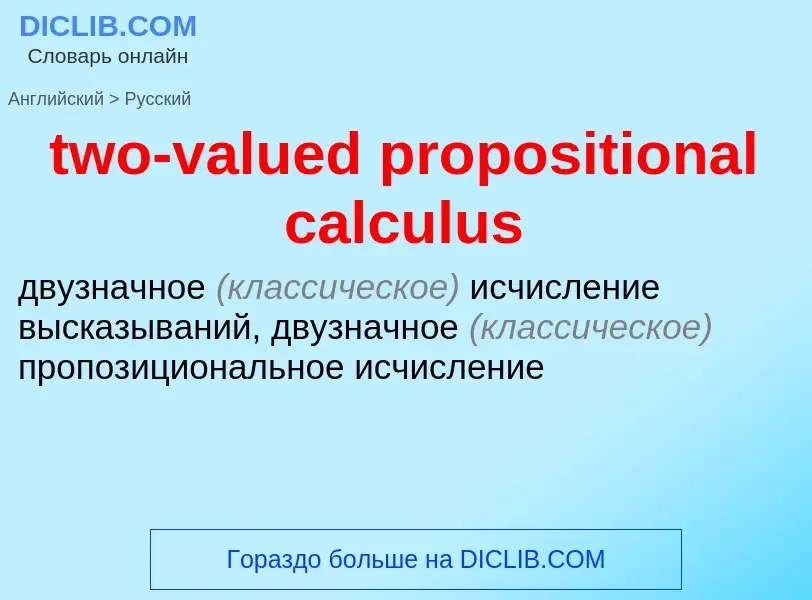Μετάφραση και ανάλυση λέξεων από τεχνητή νοημοσύνη
Σε αυτήν τη σελίδα μπορείτε να λάβετε μια λεπτομερή ανάλυση μιας λέξης ή μιας φράσης, η οποία δημιουργήθηκε χρησιμοποιώντας το ChatGPT, την καλύτερη τεχνολογία τεχνητής νοημοσύνης μέχρι σήμερα:
- πώς χρησιμοποιείται η λέξη
- συχνότητα χρήσης
- χρησιμοποιείται πιο συχνά στον προφορικό ή γραπτό λόγο
- επιλογές μετάφρασης λέξεων
- παραδείγματα χρήσης (πολλές φράσεις με μετάφραση)
- ετυμολογία
two-valued propositional calculus - translation to ρωσικά
общая лексика
двузначное (классическое) исчисление высказываний
двузначное (классическое) пропозициональное исчисление
Βικιπαίδεια
In mathematical logic, Frege's propositional calculus was the first axiomatization of propositional calculus. It was invented by Gottlob Frege, who also invented predicate calculus, in 1879 as part of his second-order predicate calculus (although Charles Peirce was the first to use the term "second-order" and developed his own version of the predicate calculus independently of Frege).
It makes use of just two logical operators: implication and negation, and it is constituted by six axioms and one inference rule: modus ponens.
Frege's propositional calculus is equivalent to any other classical propositional calculus, such as the "standard PC" with 11 axioms. Frege's PC and standard PC share two common axioms: THEN-1 and THEN-2. Notice that axioms THEN-1 through THEN-3 only make use of (and define) the implication operator, whereas axioms FRG-1 through FRG-3 define the negation operator.
The following theorems will aim to find the remaining nine axioms of standard PC within the "theorem-space" of Frege's PC, showing that the theory of standard PC is contained within the theory of Frege's PC.
(A theory, also called here, for figurative purposes, a "theorem-space", is a set of theorems that are a subset of a universal set of well-formed formulas. The theorems are linked to each other in a directed manner by inference rules, forming a sort of dendritic network. At the roots of the theorem-space are found the axioms, which "generate" the theorem-space much like a generating set generates a group.)

